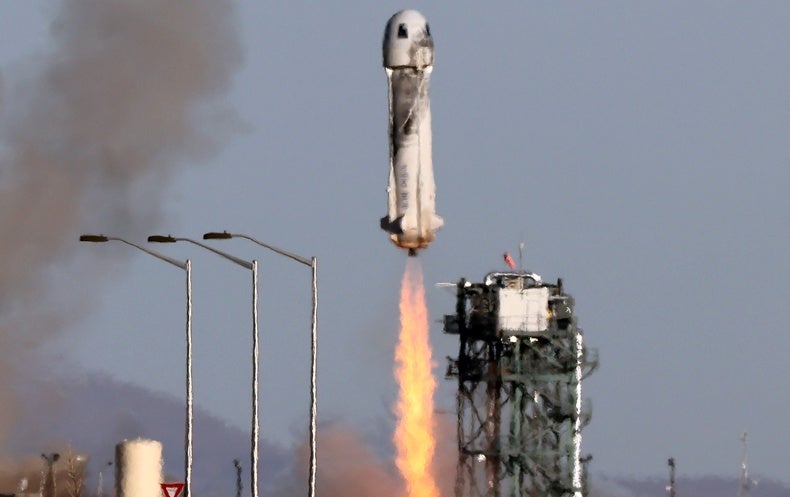Within decades, hundreds and perhaps thousands of average civilians will travel, live and work in space. Along with their space suits, they will bring with them their illnesses, chronic health problems and disabilities.
That changes the space story because until recently, career astronauts have been the only travelers in space, aside from the infrequent space tourist. But now that new space businesses are launching, the travelers and workers will be mostly civilians.
This civilian move into space has already started. Ticket-buying or privately funded passengers have traveled into suborbital space, 50 to 60 miles above Earth, during the past couple of years, courtesy of “New Space” firms Blue Origin and Virgin Galactic. In September 2021, billionaire Jared Isaacman rented Elon Musk’s Crew Dragon Resilience spaceship to carry him and three other civilians on a three-day journey around the Earth. Even without scientific evidence about health risks of such travel, Isaacman and Musk are willing to push the envelope further: They plan another flight this year called Polaris Dawn that would carry a private crew of four to the highest Earth orbit ever flown; the flight will include a spacewalk, one of space’s most hazardous endeavors. In addition, NASA has awarded incentive grants to three space corporations to build commercial orbital platforms that will start operating by the end of this decade. These space stations will be occupied by civilians as tourists and employees.
We need to go the extra mile to protect civilians if they are to travel, live and work in space.
NASA’s reports on astronauts before, during and after extended space travel and habitation make this clear: astronauts face chronic motion sickness, neurological disorders, cardiovascular problems, increased risk for blood clotting and vision problems, as well as increased risks of cancer, muscle atrophy and bone loss. That’s despite their excellent health, physical and mental fitness, and years of training. As astronauts, they are fully aware of these risks and willing to take them. As former astronaut and now Senator Mark Kelly once said, “Being an astronaut is a high-risk job.” But average civilians in space should not take such risks, which for them are even more real.
In 2022, the CDC reported that within the U.S. population six in 10 adults have chronic disease, and four in 10 have two or more chronic diseases. Also, one in four have disabilities. These health conditions add a new and challenging dimension to space hazards on the human body. What we have learned from NASA is that the health profiles of astronauts and the health profiles of civilians are notably different.
To get ahead of this problem, a landmark scientific meeting was hosted in 2021 by the Commercial Spaceflight Federation (CSF) with the blessings of the National Space Council. Intended to develop the first ever “Human Research Program for Civilians in the Commercialization of Space,” a workshop of 100 experts, which I co-chaired, identified high-priority human research projects to safeguard civilians in space.
Unfortunately, some of the commercial space companies behind the health research program now appear uninterested. Why the turnaround? We can only speculate, but a host of answers suggest themselves, starting with the space industry hoping to retain a 2004 decision by Congress that imposed a moratorium on new safety regulations on human spaceflight, in the absence of death, serious injury or close call; this “learning period,” which has been extended several times, gives the industry considerable leeway to experiment with humans. Second, these space companies compete with one another and are in a hurry to realize breakthroughs for their own business without slowing down for safety research. Third, some of the leaders in these companies challenge the cautions about the fragility of civilians in space. They argue that the hazards will have minor or short-term health impact. SpaceX CEO Elon Musk referred to the Inspiration4 spaceflight as “an intense roller coaster ride,” and added that anyone who can tolerate that “should be fine for flying on Dragon,” Musk’s spaceship. Some in the industry prefer to place average civilians in spaceflight, study them during and after flight and then examine ways to protect civilians in future flights. This risk-ridden exploratory approach to discovery should be discouraged. It returns us to the days of the Wright brothers (who had multiple crashes and the first air passenger death), where discovery occurs by risking calamity.
If there is a catastrophic event where civilians become seriously ill, injured or die, only then will we wake up to the proposition that humans in space should travel without harm. Only then will we realize that the best approach is to conduct an unbiased, objective, large-scale, scientific human research program against all the known risks of space travel.
But given today’s space-race realities, here’s a compromise: While space companies prosper under the moratorium, let them send civilians into space only after each one has undergone a thorough physical, mental and performance examination and preparatory training comparable to what is required of NASA’s career astronauts. Each company should publicize its preflight health and performance testing and training program. In addition, the space industry should publicly support the human research program it originally endorsed. Taking these steps would send civilians into space in the coming months and years in a responsible and safe manner. It would benefit the industry, assure public trust, and help protect civilians in space.
Even without industry support, we need health research now to protect future civilians in space, under the Federal Aviation Administration’s Office of Space Transportation (AST), Federal Aviation Agency. The AST has the experience, the mission, expertise and organizational setup to do an exceptional job.
The time to act is now by asking the Biden administration and Congress to fund a program of human research for civilians in space before it is too late, and we learn once more that “guinea pig” discoveries are rarely happy ones.
This is an opinion and analysis article, and the views expressed by the author or authors are not necessarily those of Scientific American.

